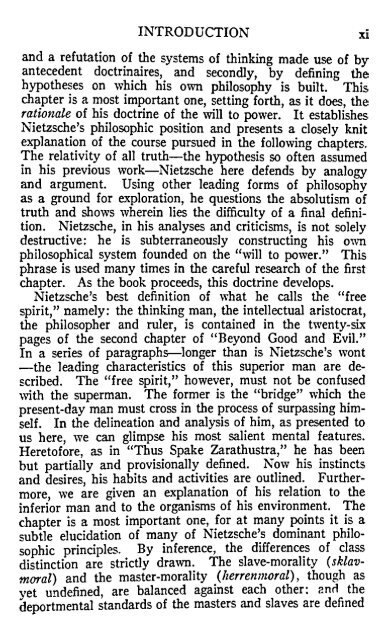Macmillan
1NB5fvA
1NB5fvA
Create successful ePaper yourself
Turn your PDF publications into a flip-book with our unique Google optimized e-Paper software.
Nietzsche<br />
INTRODUCTION<br />
xi<br />
and a refutationof the systemsof thinkingmade use of by<br />
antecedent doctrinaires, and secondly,by definingthe<br />
hypotheseson which his own philosophyis built. This<br />
chapteris a most important one, settingforth,as it does,the<br />
rationale of his doctrine of the will to power. It establishes<br />
Nietzsche's philosophic positionand presentsa closelyknit<br />
explanation of the course pursuedin the followingchapters.<br />
The relativity of all truth" the hypothesis so often assumed<br />
in his "<br />
previouswork here defends by analogy<br />
and argument. Using other leadingforms of philosophy<br />
as a ground for exploration, he questionsthe absolutism of<br />
truth and shows wherein lies the difficulty of a<br />
Nietzsche, in his analysesand<br />
final definition.<br />
criticisms, is not solely<br />
destructive: he is subterraneously constructing his own<br />
philosophical system founded on the "will to power." This<br />
phraseis used many times in the carefulresearch of the first<br />
chapter. As the book proceedsțhis doctrine develops.<br />
Nietzsche's best definition of what he calls the "free<br />
the intellectual aristocrat,<br />
The<br />
"free spirit," however,must not be confused<br />
with the superman. The former is the "bridge"which the<br />
spirit," namely: the thinkingman,<br />
the philosopher and ruler,is contained in the twenty-six<br />
pages of the second chapterof "Beyond Good and Evil."<br />
In a<br />
"<br />
series of paragraphslongerthan is Nietzsche's wont<br />
the leadingcharacteristicsof this superiorman are de-<br />
"<br />
scribed<br />
present-day man must cross in the process of surpassing himself.<br />
In the delineationand analysis of him, as presentedto<br />
us here,we can glimpsehis most salient mental features.<br />
Heretofore,as in "Thus Spake Zarathustra,"he has been<br />
but partially and provisionally defined. Now his instincts<br />
and desires, his habits and activities are outlined. Furthermore,<br />
we are given an explanation of his relation to the<br />
inferior man and to the organismsof his environment. The<br />
chapter is a most importantone, for at many pointsit is a<br />
subtle elucidation of many of Nietzsche's dominant philosophic<br />
principles. By inference țhe differences of class<br />
distinctionare strictly drawn. The slave-morality {sklavtnaral)and<br />
the master-morality (herrenmoral) though as<br />
,<br />
yet undefined,are balanced againsteach other: and the<br />
deportmental standardsof the masters and slaves are defined




